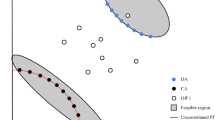Abstract
A distributed coevolutionary algorithm is proposed to solve the multiobjective hybrid flowshop scheduling problems to minimize the maximum completion time and total tardiness of jobs. The framework of the distributed coevolutionary algorithm consists of a global agent and multiple local agents. The global agent and local agents evolve independently and cooperate by interchanging a selected solution list. Unlike the cooperative coevolutionary algorithms in the literature, the proposed algorithm does not decompose the scheduling problem and executes evolutionary operations based on the whole solution of the problem in all the agents. SPEA2 is the core components in the local agents. Path relinking is applied in order to implement the evolutionary computation among non-dominated solutions in the global agent. We analyzed the time complexity of the proposed algorithm. To evaluate the performance against the benchmark of multiobjective evolutionary algorithms, it is tested on a large number of computational instances. The computational experiments show the proposed distributed coevolutionary algorithm can obtain better solution quality than other algorithms within given computational time.
Similar content being viewed by others
References
Johnson SM (1954) Optimal two- and three-stage production schedules setup times included. Nav Res Logist Q 1(1):61–68
Rajendran C (1993) Heuristic algorithm for scheduling in a flowshop to minimize total flowtime. Int J Prod Econ 29:65–73
Parthasarathy S, Rajendran C (1998) Scheduling to minimize mean tardiness and weighted mean tardiness in flowshop and flowline based manufacturing cell. Comput Ind Eng 34:531–546
Ying KC, Liao CJ (2004) An ant colony system for permutation flow-shop sequencing. Comput Oper Res 31(5):791–801
Anurag A, Selcuk C, Enes E (2006) Improvement heuristic for the flow-shop scheduling problem—an adaptive-learning approach. Eur J Oper Res 169:801–815
Safari E, Sadjadi SJ, Shahanagh K (2010) Scheduling flowshops with condition-based maintenance constraint to minimize expected makespan. Int J Adv Manuf Technol 46:757–767
Naderi B, Javid AA, Jolai F (2010) Permutation flowshops with transportation times: mathematical models and solution methods. Int J Adv Manuf Technol 46:631–647
Oguzi C, Ercan MF (2005) A genetic algorithm for hybrid flow-shop scheduling with multiprocessor tasks. J Sched 8:323–351
Zandieh M, Fatemi Ghomi SMT, Moattar Husseini SM (2006) An immune algorithm approach to hybrid flowshops scheduling with sequence-dependent setup times. Appl Math Comput 180:111–127
Alaykýran K, Engin O, Döyen A (2007) Using ant colony optimization to solve hybrid flow shop scheduling problems. Int J Adv Manuf Technol 35:541–550
Naderi B, Zandieh M, Roshanaei V (2009) Scheduling hybrid flowshops with sequence dependent setup times to minimize makespan and maximum tardiness. Int J Adv Manuf Technol 41:1186–1198
Defersha FM, Chen M (2012) Mathematical model and parallel genetic algorithm for hybrid flexible flowshop lot streaming problem. Int J Adv Manuf Technol 62:249–265
Varadharajan TK, Rajendran C (2005) A multi-objective simulated-annealing algorithm for scheduling in flowshops to minimize the makespan and total flowtime of jobs. Eur J Oper Res 167:772–795
Yandra TH (2007) A new multiobjective genetic algorithm with heterogeneous population for solving the flowshop scheduling problem. Int J Comput Integr Manuf 20(5):465–477
Minella G, Ruiz R, Ciavotta M (2008) A review and evaluation of multiobjective algorithms for the flowshop scheduling problem. INFORMS J Comput 20(3):451–471
Karimi N, Zandieh M, Karamooz HR (2010) Bi-objective group scheduling in hybrid flexible flowshop: a multi-phase approach. Expert Syst Appl 37:4024–4032
Yagmahan B, Yenisey MM (2010) A multi-objective ant colony system algorithm for flow shop scheduling problem. Expert Syst Appl 37:1361–1368
Rosin CD, Belew RK (1997) New methods for competitive co-evolution. Evol Comput 5(1):1–29
Potter MA, Jong KD (2000) Cooperative co-evolution: an architecture for evolving coadapted subcomponents. Evol Comput 8(1):1–29
Coello CAC, Sierra MR (2003) A co-evolutionary multi-objective evolutionary algorithm, In Proceedings, 2003 Congress on Evolutionary Computation, Canberra, Australia: 482–489
Popovici E, Jong KD (2006) Sequential versus parallel cooperative coevolutionary algorithms for optimization. In Proceedings, IEEE Congress on Evolutionary Computation, Vancouver, BC, Canada: 16–21
Goh CK, Tan KC, Liu DS, Chiam SC (2010) A competitive and cooperative co-evolutionary approach to multi-objective particle swarm optimization algorithm design. Eur J Oper Res 202:42–54
Tan KC, Yang YJ, Goh CK (2006) A distributed cooperative co-evolutionary algorithm for multi-objective optimization. IEEE Trans Evol Comput 10(5):527–549
Subbu R, Sanderson AC (2004) Modeling and convergence analysis of distributed coevolutionary algorithms. IEEE Trans Syst Man Cybern B Cybern 34(2):806–822
Liu J, Zhong W, Jiao L (2006) A multiagent evolutionary algorithm for constraint satisfaction problems. IEEE Trans Syst Man Cybern B Cybern 36(1):54–73
Glover F, Laguna M (1997) Tabu search. Kluwer Academic Publishers, Boston
Zhang GQ, Lai KK (2006) Combining path relinking and genetic algorithms for the multiple-level warehouse layout problem. Eur J Oper Res 169:413–425
Zitzler E, Laumanns M, Thiele L (2001) SPEA2: improving the strength Pareto evolutionary algorithm. Technical Report 103, Computer Engineering and Networks Laboratory (TIK), ETH Zurich.
Deb K (2002) A fast and elitist multiobjective genetic algorithm: NSGA-II. IEEE Trans Evol Comp 6:182–197
Author information
Authors and Affiliations
Corresponding author
Rights and permissions
About this article
Cite this article
Su, S., Yu, H., Wu, Z. et al. A distributed coevolutionary algorithm for multiobjective hybrid flowshop scheduling problems. Int J Adv Manuf Technol 70, 477–494 (2014). https://doi.org/10.1007/s00170-013-5267-4
Received:
Accepted:
Published:
Issue Date:
DOI: https://doi.org/10.1007/s00170-013-5267-4




